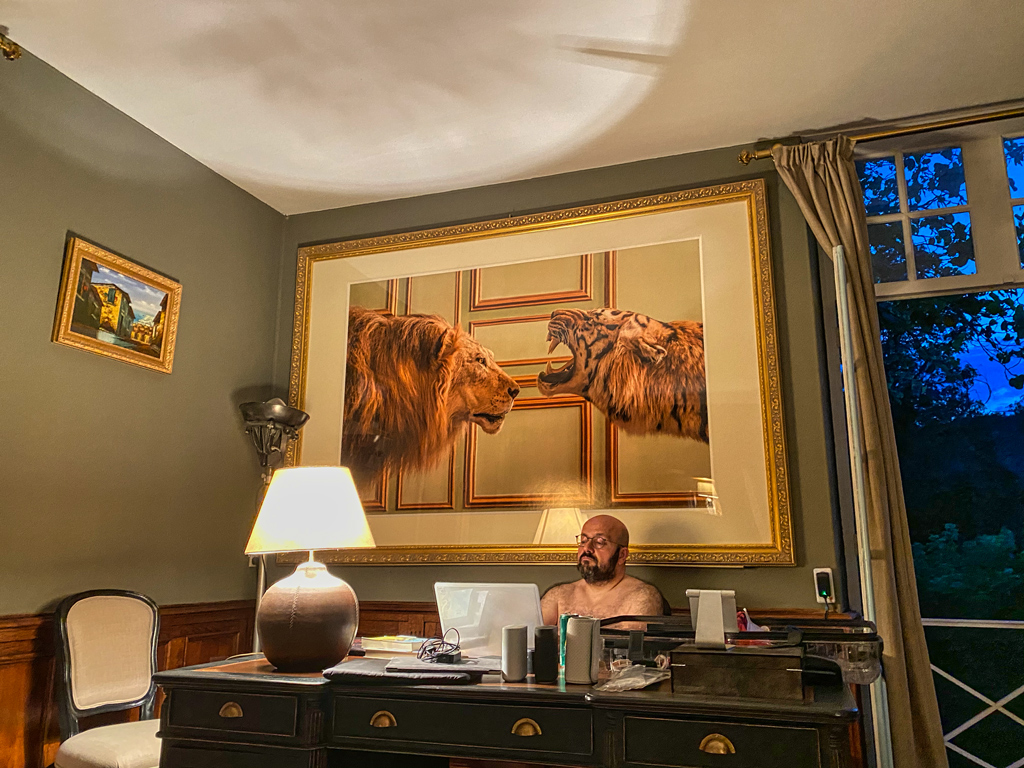
New Yorkers’ tongues had long since stopped wagging. People still sat together around the table, to be sure, but they didn’t say much to each other anymore—or anything at all. At the Goldsteins’ home, however, there was still debate to be had. Perhaps it was because Maurice and Betty knew how to loosen these tongues held fast by decorum, how to coax them with tender meat and obscure spices—not to mention the best schnapps in the city. On Friday nights, their 86th Street abode was home to boisterous company that was unafraid of controversy.
In the afternoons, when Betty returned from NYU—where this year she was giving a course on Walter Pater—she still made time to don the costume of the perfect Jewish housewife, one that had been worn by her mother and grandmother before her almost from birth. Over the years, she had stopped seeing this as being in conflict with the things she taught at university. The blossoming flesh of the artwork she presented to her students, the outward stirrings of life traced by the pencils or brushes of artists long-dead—Betty recreated all of it in her own way, at the table and in the chiaroscuro of her apartment.
“Just because the Mona Lisa is hairless doesn’t mean she’s a whore.”
Maurice permitted himself a small smile beneath his large walrus moustache. He was the only person at the firm to still wear one. It made others laugh at his expense, of course, but it had also helped impose a paternal image which had in no small way contributed to his success in court.
“Actually, it’s thought that upper-class women of the time also went in for full hair removal, right down to their eyebrows and eyelashes.”
“So is that when we got into the habit of making women submit to all men’s bizarre fantasies, then?” Renée asked.
Maurice’s niece had nothing but contempt for him, her mother’s filthy rich brother; she couldn’t understand what a woman as sophisticated as Betty was doing with such a brute (and for so many years!). Still, she never turned scorned the hearty meals she was sure to find at their home on the Upper West Side. Her entry into the New Yorker, where she’d made a name for herself with critiques, as outspoken as they were original, of “whitewashed” films and heteronormative fashions, did not change this. Lured by a boundless admiration for Betty and an unspoken desire to satisfy at least one of her sensual cravings—namely, those of a stomach she otherwise considered an enemy—and perhaps above all by the promise of venting her contempt towards that fanatical idiot Maurice, she was quite happy to leave her Cobble Hill brownstone and grace the Goldsteins with her dear presence one or two Fridays a month. This time, she had brought along her current “partner,” some shapeless, artless Kyle or other whom she had convinced to swap out his computer engineer’s hoodie for a presentable sweater.
“When I hear you say that, my dear, I realize how lucky I am to be old. I take it as a sign I made it out of the disaster of the 70s. No, listen to me—I’m trying to tell you something! You’re speaking nonsense and no one’s pointing it out to you, so I’d better take on the job myself, hadn’t I? Especially because when my students say the same things—like just this morning—I have to put on my kid gloves to point out their stupidity, or else, if one of them is a bit of a depressive, I’m risking a lawsuit…”
“Well, lucky me to take one for the team. At least tell me what you’re talking about.”
“I’ll tell you, yes. You have all been taught, for the last forty or fifty years you’ve been taught that everything is a construct. Everything’s a construct, and everything’s about power. Body hair and birth and all the rest of it.”
“And as far as you’re concerned, that’s wrong?”
“Absolutely.”
“But we haven’t always removed our body hair, have we? And we haven’t always given birth lying on our backs.”
“No, you’re right. But just try giving birth once, dear, and you’ll realize it’s not a social construct but the most animalistic, the most carnal, the most… viscous thing imaginable (not to mention the most painful, but that, at least, I think you’re aware of). Don’t you see what I’m saying? Your schools have gotten it into your heads that nothing exists apart from the social, the artificial, and that being clever means breaking this artifice down. I’m just trying to tell you that before someone decided—wrongly, no doubt—to make women give birth on their backs, billions of women had just simply given birth, and billions of monkeys had done it before that, enough females to populate the whole galaxy. There’s nothing socially constructed about that.”
“Is that what you tell your students?”
“Among other things. Let’s just say I try to make them understand that art isn’t just artifice. There’s something real behind it, you know? And once you deconstruct the stereotypes, what do you know, you’re left instead with powerful archetypes that are much more interesting. They’re links in a chain taking us back to our furthest ancestors, to the first myth-makers, and before them, even, to when we were animals.”
“So you’re saying that’s nature too? Nature wants women to be hairless?”
Renée’s companion sensed she’d scored a point and smiled. The imperceptible quiver of Maurice’s moustache, however, might have suggested to a shrewd observer that at the other end of the table, Betty had not yet said her last word. After serving her guests their matzah balls, glossy with duck fat, she returned to her seat, swallowed a schmaltz and ginger dumpling and looked her niece in the eye.
“What’s natural is wanting to please. Even animals—birds, monkeys—live for that, and only that. To please. To seduce. Power is a natural thing, my dear, and I believe it’s a beautiful thing, too. And this goes for men as much as for women. I know it’s something that’s disappearing these days, but you can’t blame the women of my generation, who shave their bodies and work to look their best, if your generation matches up poor girls still willing to make an effort with boys incapable of dressing like anything other than an amorphous slob.”
Involuntarily, everyone looked towards Kyle. Betty could be mean if pedagogy called for it, and it was likely the jab was intentional.
“The men of my day,” she continued, “were just as well-groomed as the women were. And I’ll add this: the paintings I love best are portraits of men. Men of all centuries, full of masculinity, sometimes because of their power, my dear, but also because of their restraint… their beards, either carefully shaven or groomed like the hedges of a French garden, their splendid clothes, their stately bearing. Do you get that? When I was your age and starting work on my thesis, I was absolutely smitten by Titian’s courtiers. And by Cary Grant in North by Northwest—just watching him shave in the mirror of the train station bathroom was enough to make me shiver.”
Maurice knew exactly what his wife was talking about, and he knew which other memories she had in mind as well. He took a sip of wine and slowly wiped his lips and moustache. Betty went on.
“You girls, you privileged girls, you sneer at things in your families—let me finish, Renée! You sneer at things in your own families and in the families of the people you know—White bourgeois families—that you would tolerate or even appreciate elsewhere. Worse, you sneer at things that, deep down, you would like for yourself. But I grew up very differently, you know? So did Maurice. Your mother’s family and mine were the same. We were poor, but we had—and I’m mostly talking about the women—we had personality. Yes, that much we had. And we were real women, all of us, willing to polish off a good meal or tremble in the arms of a man—or another woman, for that matter, it was known to happen! You spend your life spitting on white culture, and good for you, but if you spent a little more time talking to the women in this city, Black and Latina women, you’d hear a similar speech from their mouths as the one you’re getting from me.”
“Yeah, that’s called colonial al—”
“Well then, dear, I must be alienated too. I want to tell you something else. You know I’ve had my ups and downs with religion. These days, I do all of this for Maurice, mostly, and also partly because it’s fun. But there’s one thing I’ve kept in my heart ever since my teenage years in Flatbush. I dearly love the masculinity of Jewish men. The rabbi of our shul hardly spoke any English, but at fifteen years old I would look at his beard and just melt. For me, God is anthropomorphic; it’s an occupational hazard. So what? When I think of Him, I sometimes picture old Schlesinger, that air he had of a tamed beast. Sometimes I think of Cary Grant, or my mother, or the Mona Lisa herself. Schlesinger, with his well-trimmed beard, the colour of ash, his three-piece suits and his grey fedora, was something out of old Europe. And there was something else, too, something a bit wilder—something further East, maybe. A mix of Galicia and Assyria. Do you know what I mean? Years later, I came across a portrait of Titian that was the spitting image of him.”
“So, do you want men to shave, then, or to grow their beards?”
“I want men who know they have a body and who wake up every morning wondering how they are going to make it into a work of art,” Betty replied, with a glance at Kyle’s sparse bristles.
This time, Renée knew she should keep her mouth shut. Never before had she so despised and adored her aunt at once.
“You know the hymn the kids chant at shul… Anim zemiros. I think that’s where it comes from for me. God and His black curls, the “helmet of salvation,” the arms of a warrior, the face of an old man… you haven’t forgotten that, have you?”
“So, a pretty masculine god, then?”
“Who could also be feminine. The black curls are in the Song of Songs, too. As I see it, God could even be the woman in the poem—why not? The Shekhina is feminine. But not, you’ll grant me, a woman who wallows in ugliness, like your hairy friends in Brooklyn, or like an Eishes Chayil in her wig! Besides, if you’re going to grow your body hair, you might as well do it with some grace, you might as well do it in a way that’s pleasing. In the 19th century, men found body hair arousing… but the way you girls make a cause out of your body hair—like you make a cause out of your curves or your morning poop—I have to say it puts me off my dinner.”
As Maurice got up to bring the next course, there was silence for a few moments. And either because she was trying to regain her composure or because she truly felt it was bad form for him to be the only one standing, Renée passed the dishes to her uncle, letting everyone at the table see her impeccably bare armpits.
Translated by Emma Roy

